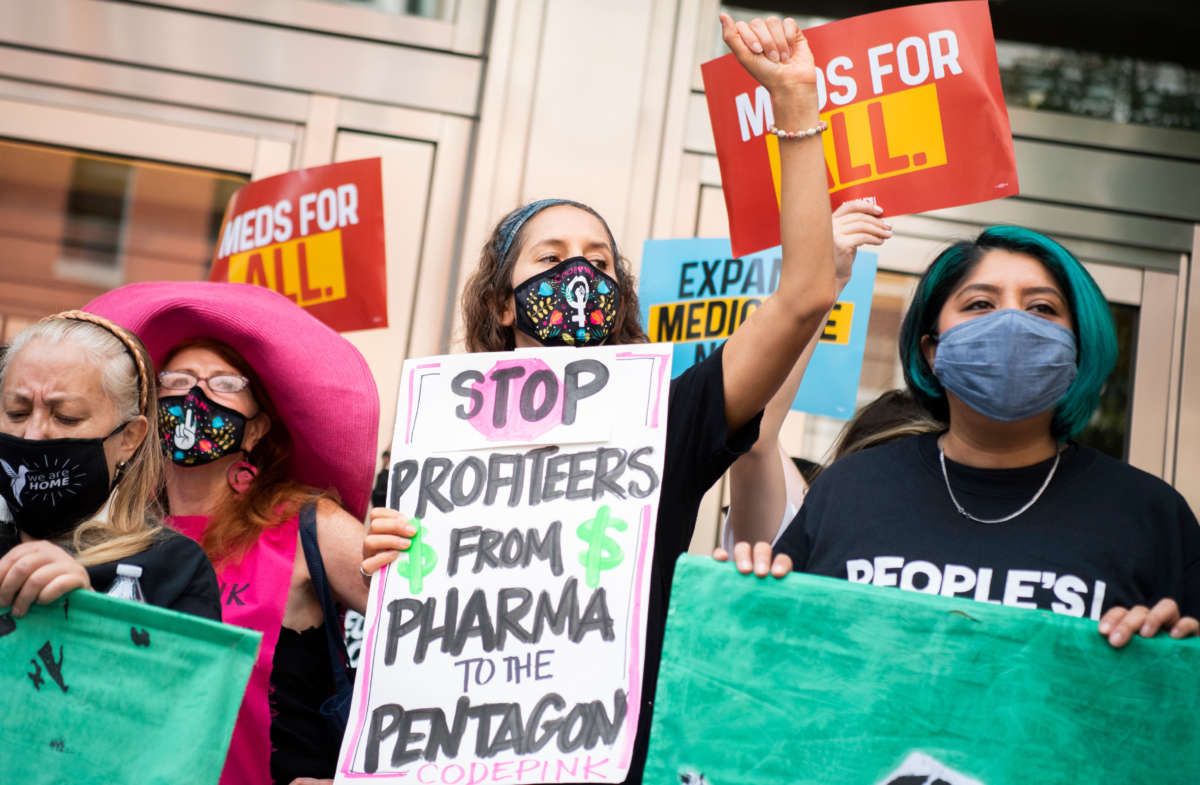Support justice-driven, accurate and transparent news — make a quick donation to Truthout today!
Rep. Pramila Jayapal warned Monday that the upcoming midterm elections could be painful for Democrats if they fail to substantively deliver on their healthcare-related campaign promises, which ranged from tackling sky-high drug prices to lowering the Medicare eligibility age.
“It has been a concern for us,” Jayapal (D-Wash.), chair of the Congressional Progressive Caucus and lead sponsor of the Medicare for All Act of 2021, told the Washington Post. “You can see it with the number of Democrats in vulnerable districts across the country who want to be able to go back and tell people that we’ve lowered their costs for child care, for pre-K, for elder care, for drug pricing, for healthcare.”
The stagnation of Democrats’ $1.75 trillion Build Back Better package — thanks in large part to opposition from Sen. Joe Manchin (D-W.Va.) and other right-wing lawmakers — has increased the likelihood that the party will enter campaign season having accomplished little on healthcare, which voters consistently view as a top priority.
Republicans, which have obstructed their Democratic counterparts at every turn, are already favored to retake the House in the midterms, riding a wave of voter suppression and aggressive map-rigging.
The current, dramatically scaled-back version of the Build Back Better Act includes a new hearing benefit for Medicare, provisions to reduce sky-high prescription drug costs, and policy changes aimed at addressing the Medicaid coverage gap.
More sweeping proposals to lower the Medicare eligibility age to 60 and add dental and vision coverage to the program were removed at the behest of corporate-backed right-wing Democrats, including Manchin.
The Medicare for All Act — which has the support of a majority of the House Democratic caucus and the public, but not President Joe Biden — hasn’t even been put on the table for discussion. The Democratic Party’s 2020 platform, unveiled in the midst of the Covid-19 pandemic, mentions Medicare for All just once but does not endorse it.
With Congress and the Biden administration failing to act, pharmaceutical companies are raising prices for prescription drugs at will and Medicare beneficiaries are facing a massive premium hike — neither of which bode well for the party in full control of the federal government.
The healthcare provisions that have survived Build Back Better talks thus far are likely to crumble if Democrats aren’t able to salvage the bill, which has been put on hold as the party focuses on voting rights legislation that also faces long odds in the Senate.
“We’ve campaigned for a long time on taking it to the drug companies and passing the bulk negotiation of prices. It’s something that voters understand,” Sen. Chris Murphy (D-Conn.) told the Post. “I think it’s problematic if we can’t get that done.”
With the full Build Back Better Act stuck in the Senate, some vulnerable frontline Democrats are calling on the party’s leadership to break the bill into pieces and hold votes on popular individual elements, including prescription drug price reforms.
“People want to know that the people they elect can get things done that are going to make a difference in the lives of ordinary citizens,” said Rep. Susan Wild (D-Pa.), who narrowly won reelection in 2020.
But some outside progressives argue such an approach would be a mistake and would not increase the likelihood of passage given that individual bills, unlike the full reconciliation package, would be subject to the Senate’s 60-vote filibuster.
“Breaking up BBB at this point when Democrats have foolishly given away all their leverage (by releasing [the bipartisan infrastructure bill]) will only reward and embolden obstruction — while further diluting an already milquetoast bill,” tweeted progressive media strategist Murshed Zaheed.
Ellen Sciales, a spokesperson for the youth-led Sunrise Movement, echoed that criticism in a statement to the Post.
“The idea of breaking up BBB into smaller bills is a false choice for Democrats,” she said. “Everything in the Build Back Better Act is urgently needed.”
“Democrats have a trifecta right now, and instead of pitting programs and communities against each other, the White House and Senate leaders should figure out a way to bring the last two senators on board,” Sciales added, referring to Manchin and Sen. Kyrsten Sinema (D-Ariz.). “It’s clear the tactic of negotiating in private is failing, and we’re quickly losing our window of opportunity to act.”
A terrifying moment. We appeal for your support.
In the last weeks, we have witnessed an authoritarian assault on communities in Minnesota and across the nation.
The need for truthful, grassroots reporting is urgent at this cataclysmic historical moment. Yet, Trump-aligned billionaires and other allies have taken over many legacy media outlets — the culmination of a decades-long campaign to place control of the narrative into the hands of the political right.
We refuse to let Trump’s blatant propaganda machine go unchecked. Untethered to corporate ownership or advertisers, Truthout remains fearless in our reporting and our determination to use journalism as a tool for justice.
But we need your help just to fund our basic expenses. Over 80 percent of Truthout’s funding comes from small individual donations from our community of readers, and over a third of our total budget is supported by recurring monthly donors.
Truthout has launched a fundraiser to add 500 new monthly donors in the next 9 days. Whether you can make a small monthly donation or a larger one-time gift, Truthout only works with your support.
